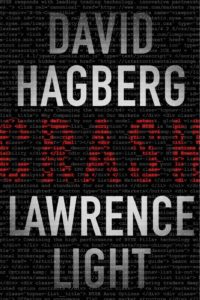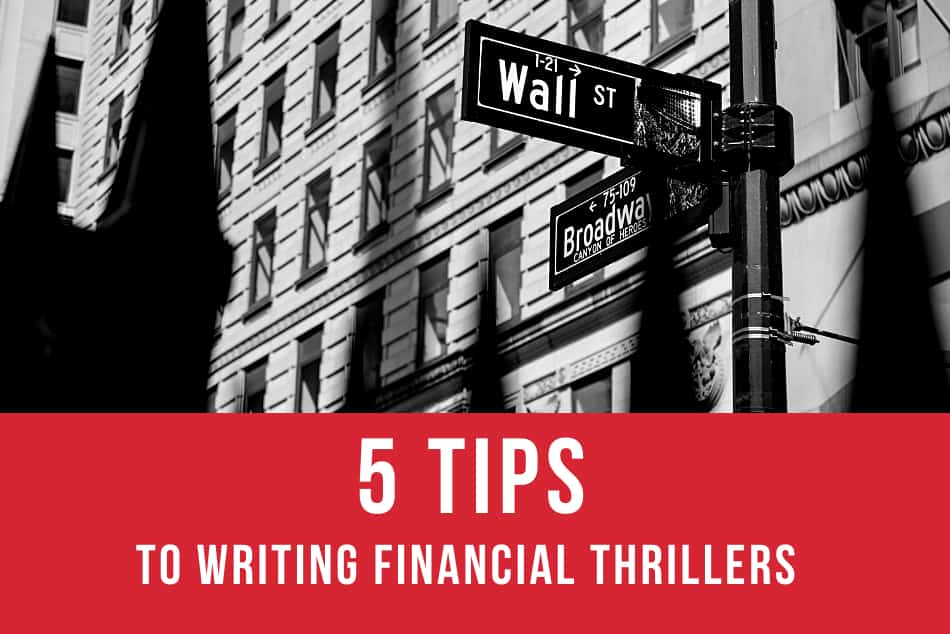FIVE TIPS TO WRITING FINANCIAL THRILLERS
You’ve heard the saying, write what you know.
Me? I’ve always been a journalist—covering everything from small towns to Congress for a Long Island daily, Newsday—and I’ve loved it all. But I really found my niche when I began working in business journalism. I covered corporate finance, insurance and real estate for Business Week, edited financial coverage for Forbes, and now write about market and economic trends for a rarefied subscription service catering to highly placed investment managers.
That’s why, when I began to write mysteries and thrillers, I immediately gravitated to financial crimes and their consequences. From that experience, I have assembled a few rules for writing financial thrillers. Or for any mysteries with a business setting.
1. Understand the money movers
Not all finance folks wear pinstripes. For one thing, they’re not all men. Get to know the players and tailor their mannerisms accordingly.
Investment bankers make deals, for mergers, for taking companies public, for floating news issues of stocks or bonds. These smooth operators work with the wealthiest clients and companies and need to impart confidence. Traders, a rough-and-tumble bunch, buy and sell stocks electronically, looking to make profits for their clients and their employer by exploiting differences in prices.
Brokers are the middlemen and women you contact when you order a stock transaction. Quants are computer-driven analysts, and many are, let’s say, socially challenged. They figure out what’s hot and what’s not among stocks by doing a lot of complicated math, and find abstruse ways to trade them. Techies oversee the vital IT systems through which the money flows from all that buying and selling; they also guard against hacker intrusion and are usually nerds or Goths, frequently younger than their peers. Remember, you can go against type. But you have to know who the players are.
For a quick course, read Michael Lewis’ great nonfiction tale of his introduction to Wall Street, Liar’s Poker, or watch the TV movie of Barbarians at the Gate or the excellent book it was based on, by Bryan Burrough and John Helyar, about the takeover of RJR Nabisco, a tobacco and snack giant. In the Lewis book, note how different the slobby, foul-mouthed trader Lewie Ranieri is from the handsome, suave investment banker Robert Dall.
2. Define the Stakes
What’s at stake should be clear to the reader quickly. We’re talking about money here: gaining it, losing it. What is the danger and what are the consequences? The stakes may be large (a Second Great Depression may result) or smaller (a factory may close due to rapacious Wall Street buccaneers, throwing hundreds out of work).
If an identity thief gets your PIN number, he may drain your bank account. If the stock market crashes, millions will go broke. If the international balance of trade breaks down, wars may erupt. Whatever it is, the premise and significance should be clear very early. You may want to start with a single widow risking her small savings, but later ratchet up to a systematic plot to defraud thousands.
Make sure the stakes, despite their size, are important. Is the fate of one investor hanging in the balance? Is the fate of a company at risk? Is the nation’s money supply in jeopardy? Is the world economy in trouble? Is someone’s livelihood at risk?
3. Talk the talk
Get the jargon right and try to explain it in context—what it means to the characters, personally, emotionally—rather than insert an exhaustive, mind-numbing definition.
For instance, you could write: “John loved his job. Arbitrage, the buying and selling of assets in different markets at different price points, was risky and exhilarating.” Snore.
But wouldn’t this be better: “John adored arbitrage. When he bet his career on exploiting a tiny, temporary price difference between the price of IBM stock in New York and Hong Kong, he got a better rush than cocaine.”
Readers don’t want to be condescended to. You don’t need to drone on endlessly about the intricacies of arbitrage. A brief summary does the job. Readers are smart and they like to feel smart. They’ll get it.
4. Setting: Show the lush life, and the tawdry one, too
From the soaring skyscrapers of Wall Street to the glamorous hush of a Swiss bank to the gritty money laundering of the Cayman Islands, the milieu needs to be detailed and realistic.
Think about the difference the setting makes. If your gambler frequents the casinos in Atlantic City, he or she is probably very different from one who hangs out on the Strip in Las Vegas. A.C. caters to lower-end gamblers who like the slot machines, Vegas to a wealthier crowd that bets more money and plays table games like blackjack. The opulence of Monaco blows them all away.
Research is key. The internet is, of course, a huge resource. But in the interests of verisimilitude, you may just need a weekend in the Alps or the Caymans. (Don’t forget to ask your accountant if the trip is tax-deductible.)
5. Read before you write
As with any genre, the best preparation is to get to know the field. Both the classics and the latest entries. And watch the important movies or TV series as well. Here are some of my favorites.
* Billions, a must-see TV series on Showtime (2016 to now) with Damian Lewis and Paul Giamatti, on an unscrupulous hedge fund manager and the prosecutor out to nail him.
* Christopher Reich’s Numbered Account, about chicanery in a secretive Swiss bank
* Joseph Finder’s Company Man, a send-up of corporate office politics, set in the sales department of an electronics firm.
* Barbarians at the Gate by Bryan Burrough and John Helyar (also the excellent made-for-TV movie starring James Garner, 1993), the nonfiction tale of a huge corporate takeover.
* Too Big to Fail, a 2011 movie with William Hurt and James Woods, on the 2008 financial crisis. The nonfiction book version, by Andrew Ross Sorkin, is a treasure trove of economics and politics, well explained.
* Oliver Stone’s Wall Street (1987,) still a great movie with Michael Douglas and Charlie Sheen, based on insider trading. The Douglas character’s famous quote: “Greed is good.”
* Michael Lewis’ Liar’s Poker, a hilarious take on how an investment bank works (here, Salomon Brothers).
* The Wolf of Wall Street (2013) with Leonardo DiCaprio, a film about a market con artist.
* Ocean’s Eleven (2001) with George Clooney and Brad Pitt, about stealing from a Las Vegas casino.
 Lawrence Light is currently the markets editor of CIO magazine. He has been a writer/editor for most of the major financial news sources of our time: Business Week, Forbes, The Wall Street Journal, and has written for Fortune, Money, Investopedia, CBS Money-watch, and many more. He has written the Karen
Lawrence Light is currently the markets editor of CIO magazine. He has been a writer/editor for most of the major financial news sources of our time: Business Week, Forbes, The Wall Street Journal, and has written for Fortune, Money, Investopedia, CBS Money-watch, and many more. He has written the Karen  Glick books, Too Rich to Live, and Fear and Greed. His short stories appear frequently, including one in Wall Street Noir, a collection from Akashic. His latest thriller is CRASH, with David Hagberg which came out in April 2020 and features a threatened economic apocalypse.
Glick books, Too Rich to Live, and Fear and Greed. His short stories appear frequently, including one in Wall Street Noir, a collection from Akashic. His latest thriller is CRASH, with David Hagberg which came out in April 2020 and features a threatened economic apocalypse.





